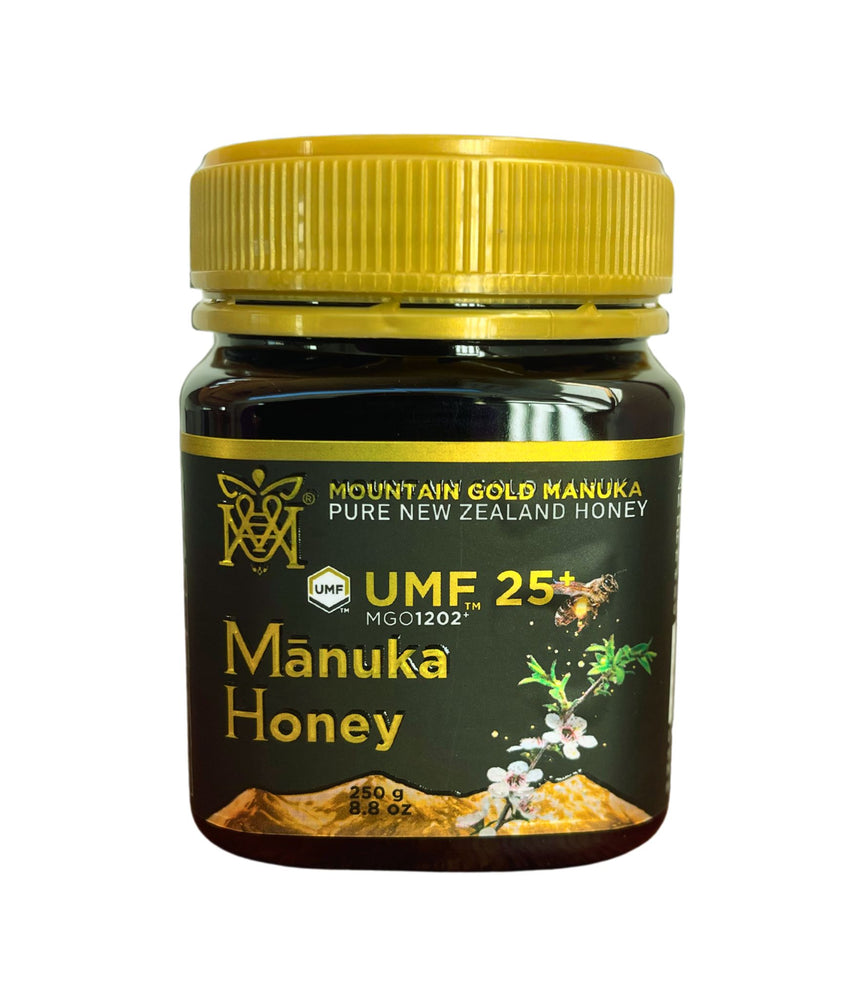إمكانات عسل مانوكا كمكمل غذائي لعلاج سرطان الثدي

استكشاف عسل مانوكا ودوره المحتمل في علاج سرطان الثدي
اكتسب عسل مانوكا، المعروف بخصائصه الفريدة وفوائده الصحية، اهتمامًا كبيرًا في السنوات الأخيرة. ينشأ هذا العسل من رحيق شجرة مانوكا (Leptospermum scoparium) في نيوزيلندا، ويتميز بمستويات عالية من ميثيل جليوكسال (MGO)، مما يساهم في خصائصه المضادة للبكتيريا والالتهابات. ومع استمرار تطور الأبحاث في العلاجات التكميلية لسرطان الثدي، يشعر الكثيرون بالفضول بشأن الدور المحتمل لعسل مانوكا في هذا السياق.
وفي دراسة جديدة نشرت في مجلة "Nutrients"، وجد باحثو جامعة كاليفورنيا في لوس أنجلوس أن عسل مانوكا يقلل بشكل كبير من نمو الورم في الفئران ذات خلايا سرطان الثدي الإيجابية لمستقبلات الإستروجين بنسبة 84% دون التأثير على خلايا الثدي الطبيعية أو التسبب في آثار جانبية كبيرة. (العنوان: عسل مانوكا يمنع تقدم سرطان الثدي البشري في النماذج السريرية قبل السريرية). المغذيات 2024 ، 16 (14)، 2369؛ https://doi.org/10.3390/nu16142369 )
وتشير النتائج إلى أن عسل مانوكا يمكن تطويره إلى مكمل طبيعي أو حتى علاج مستقل لسرطان الثدي الإيجابي لمستقبلات الإستروجين، وخاصة بالنسبة للمرضى الذين يعانون من مقاومة العلاجات التقليدية.
وفي التجارب السريرية السابقة، وجد الباحثون:
- أثبت عسل مانوكا فعاليته في تقليل نمو الورم بشكل ملحوظ في الفئران التي تعاني من خلايا سرطان الثدي الإيجابية لمستقبلات الإستروجين بنسبة 84% دون التأثير على خلايا الثدي الطبيعية أو التسبب في آثار جانبية كبيرة.
- أدت التركيزات العالية من عسل مانوكا إلى انخفاض أكبر في نمو الخلايا السرطانية.
- يعمل عسل مانوكا على تقليل مستويات مسارات الإشارة التي يتم تنظيمها بشكل تصاعدي في السرطان مثل AMPK/AKT/mTOR وSTAT3، والتي تشارك في نمو الخلايا السرطانية وبقائها.
- أثبت عسل مانوكا قدرته على تقليل انتشار الخلايا السرطانية، لكنه لم يؤثر على نمو الخلايا الظهارية الثديية البشرية الطبيعية، مما يشير إلى أنه قد يستهدف الخلايا السرطانية على وجه التحديد.
- يحفز عسل مانوكا عملية موت الخلايا السرطانية في الثدي.
- يعزز عسل مانوكا فعالية العلاجات الموجودة مثل عقار تاموكسيفين، وهو عقار مضاد للإستروجين يستخدم عادة في علاج سرطان الثدي الإيجابي لمستقبلات الإستروجين، عند استخدامه معًا.
- (مرجع: مقالة UCLA Health: دراسة أولية تظهر إمكانات عسل مانوكا كمكمل غذائي لعلاج سرطان الثدي)
ما هو عسل المانوكا؟
غالبًا ما يتم الترويج لعسل مانوكا لفوائده الطبية، بما في ذلك قدرته على دعم التئام الجروح وتعزيز المناعة ومكافحة العدوى. يتميز بتركيبته الفريدة التي تميزه عن العسل العادي، حيث يحتوي على مستويات عالية من MGO ومركبات مفيدة أخرى مثل بيروكسيد الهيدروجين والفلافونويد والأحماض الفينولية. وهذا يجعله موضوعًا مثيرًا للاهتمام للبحث، وخاصة فيما يتعلق بالأمراض المزمنة مثل السرطان.
مزيد من العلوم حول عسل مانوكا والسرطان
في حين أن البحث الذي يربط عسل مانوكا على وجه التحديد بعلاج سرطان الثدي لا يزال في مراحله المبكرة، فإن العديد من الدراسات الأخرى تشير أيضًا إلى فوائد محتملة بما في ذلك:
-
خصائص مضادة للأكسدة : تساعد مضادات الأكسدة في مكافحة الإجهاد التأكسدي المرتبط بتطور السرطان. قد تساعد مضادات الأكسدة الموجودة في عسل مانوكا في تحييد الجذور الحرة وتقليل تلف الخلايا.
-
التأثيرات المضادة للالتهابات : يرتبط الالتهاب المزمن بتطور السرطان وتقدمه. وقد ثبت أن عسل مانوكا يتمتع بخصائص مضادة للالتهابات، والتي قد تفيد مرضى السرطان.
-
النشاط المضاد للميكروبات : غالبًا ما يواجه مرضى سرطان الثدي خطرًا أعلى للإصابة بالعدوى، وخاصة أولئك الذين يخضعون للعلاج الكيميائي. قد تساعد الخصائص المضادة للبكتيريا لعسل مانوكا في دعم الصحة العامة والتعافي أثناء العلاج.
-
تحسين نوعية الحياة : على الرغم من أنه ليس علاجًا، إلا أن الخصائص المهدئة لعسل مانوكا يمكن أن تساعد في إدارة الأعراض والآثار الجانبية المرتبطة بعلاجات سرطان الثدي، مثل التهاب الحلق والتهاب الغشاء المخاطي.
دمج عسل مانوكا في خطة الرعاية
إذا كنت أنت أو أحد أحبائك تفكر في إضافة عسل مانوكا إلى نظام رعاية سرطان الثدي الخاص بك، فمن الضروري التعامل مع الأمر بعناية:
-
استشر مقدم الرعاية الصحية الخاص بك : ناقش دائمًا مع طبيب الأورام أو فريق الرعاية الصحية الخاص بك قبل تقديم أي مكمل أو علاج جديد. يمكنهم تقديم نصائح شخصية بناءً على خطة العلاج والحالة الصحية الخاصة بك.
-
اختر منتجات عالية الجودة : لا يتم تصنيع جميع أنواع عسل مانوكا على قدم المساواة. ابحث عن المنتجات التي تتمتع بتصنيف عالٍ لعامل مانوكا الفريد (UMF)، والذي يشير إلى نقاوتها وفعاليتها مثل عسل مانوكا Mountain Gold UMF.
-
استخدمه بوعي : يمكن دمج عسل مانوكا في نظامك الغذائي بطرق مختلفة - رشه على الخبز المحمص، أو مزجه في العصائر، أو تناوله بالملعقة. فقط كن حذرًا بشأن تناول السكر، وخاصة بالنسبة لأولئك الذين يديرون وزنهم أو مستويات السكر في الدم أثناء العلاج.
خاتمة
يبدو أن عسل مانوكا واعد كداعم تكميلي لأولئك الذين يعانون من سرطان الثدي. هناك حاجة إلى إجراء أبحاث مستمرة لفهم فوائده وآلياته المحتملة بشكل كامل. يجب دمج مثل هذه العلاجات الطبيعية بالتنسيق مع المتخصصين الطبيين.
في عالم حيث قد تبدو رحلة علاج سرطان الثدي مرهقة، فإن استكشاف خيارات مثل عسل مانوكا قد يوفر الراحة والدعم على طول الطريق. سواء من خلال فوائده الصحية المحتملة أو ببساطة متعة الاستمتاع بنكهته الفريدة، فإن هذا العسل الخاص لديه الكثير ليقدمه.
منتجات
عرض الكل
